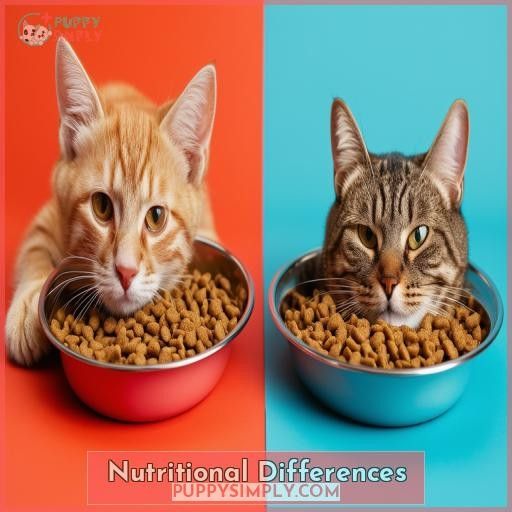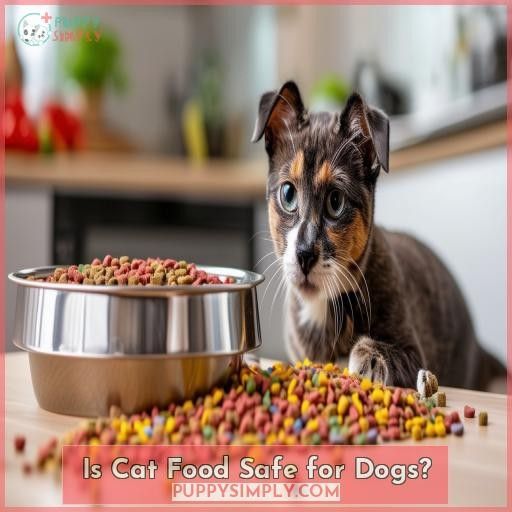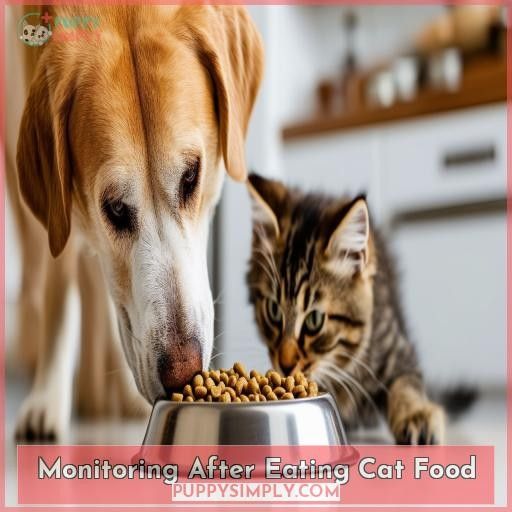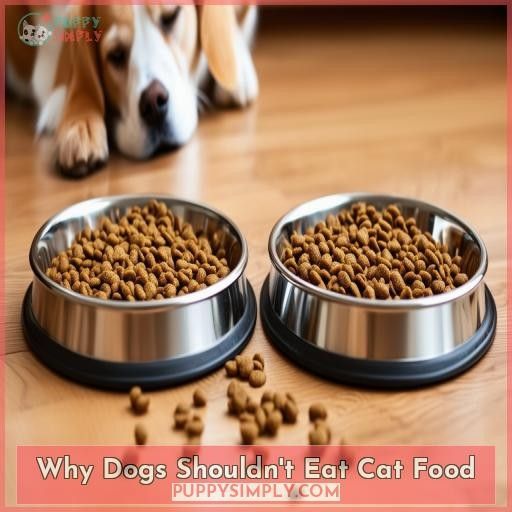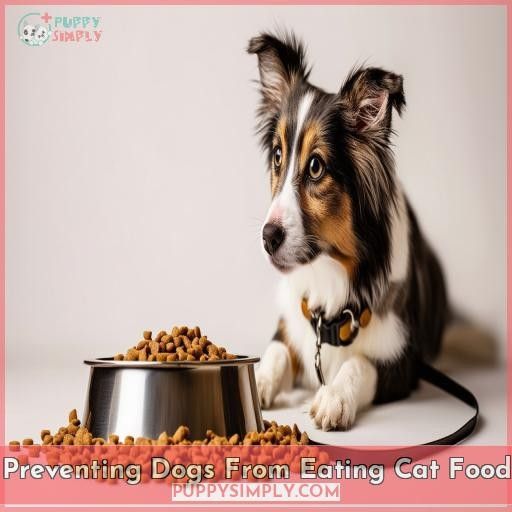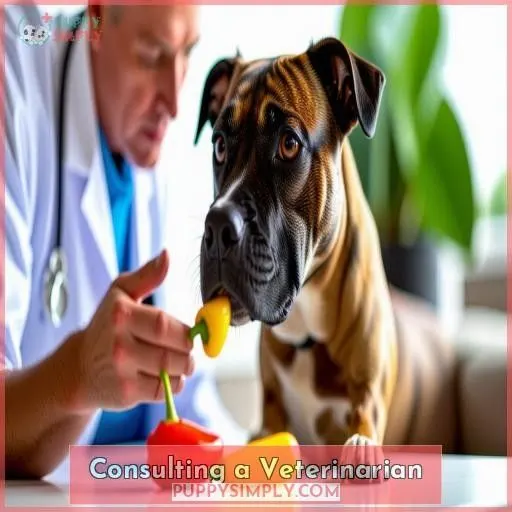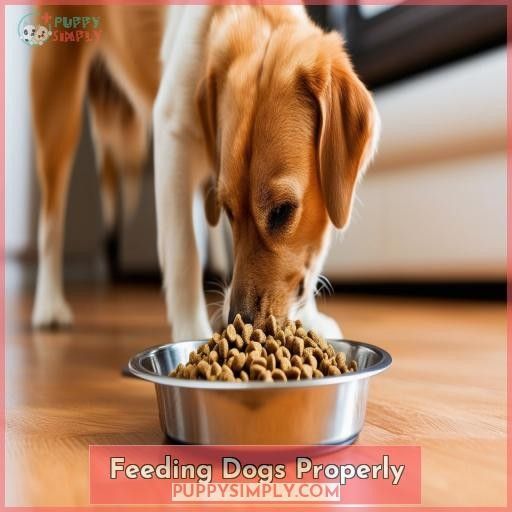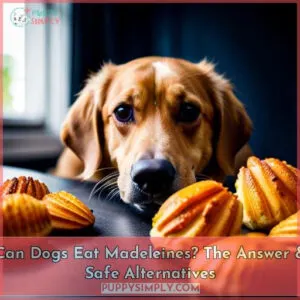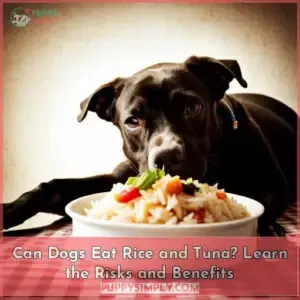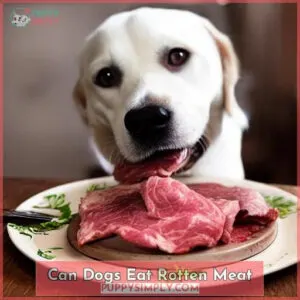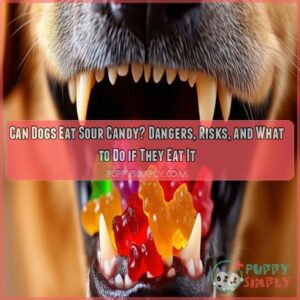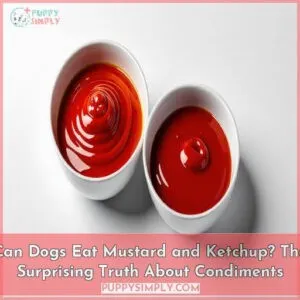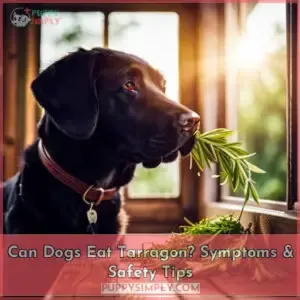This site is supported by our readers. We may earn a commission, at no cost to you, if you purchase through links.
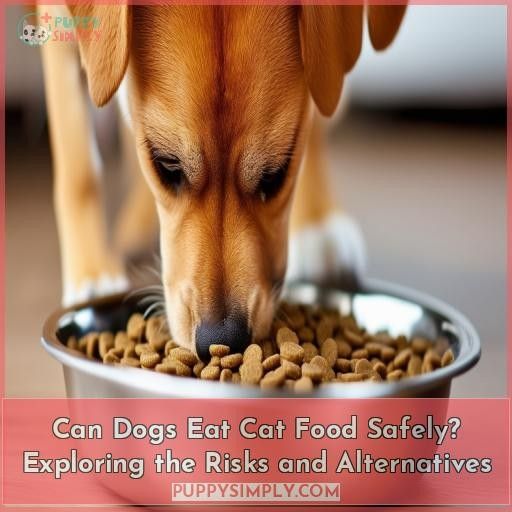 The short answer is: not regularly. While an occasional nibble of cat food likely won’t harm a healthy adult dog, making it a dietary staple carries risks.
The short answer is: not regularly. While an occasional nibble of cat food likely won’t harm a healthy adult dog, making it a dietary staple carries risks.
Cat foods are ultra-high in protein and fat to meet feline nutritional needs, which can lead to weight gain, pancreatitis, or digestive issues in dogs over time.
If your pup has gotten into the cat chow, monitor for vomiting or diarrhea.
Ultimately, dogs require a balanced diet designed to meet their omnivorous needs.
Want to dig deeper into why cats and dogs have different dietary requirements? Keep reading.
Table Of Contents
- Key Takeaways
- Can Dogs Eat Cat Food Safely?
- Nutritional Differences
- Is Cat Food Safe for Dogs?
- Monitoring After Eating Cat Food
- Why Dogs Shouldn’t Eat Cat Food
- Preventing Dogs From Eating Cat Food
- Consulting a Veterinarian
- Feeding Dogs Properly
- Frequently Asked Questions (FAQs)
- What can happen if a dog eats cat food?
- Why does my dog prefer cat food?
- Can I mix cat food with dog food?
- Can dogs and cats eat the same food?
- Can dogs gain weight from cat food?
- Is vomiting normal after eating cat food?
- How much cat food is too much?
- Do all dog breeds react the same?
- Should I restrict my dogs water intake?
- Conclusion
Key Takeaways
- Look, we all know our furry friends can be little food thieves sometimes! An occasional nibble of kitty kibble likely won’t do any harm, but making a habit of it? That’s where the trouble starts brewing, my friend.
- You see, cat food is like a rich, decadent feast for our pups – packed with protein and fat galore! But just like we humans can’t subsist on cake alone (as tempting as that sounds), our canine companions need a balanced diet too. Too much of that feline fare could lead to tummy troubles, pancreatitis, or some unwanted weight gain.
- So, while it might be hard to resist those puppy dog eyes begging for a taste, it’s best to keep Fido’s diet on the straight and narrow. A high-quality dog chow, tailored to their needs, is the way to go for a happy, healthy pup.
- But hey, if your furry buddy did happen to sneak a little too much of Fluffy’s fancy feast, keep an eye out for any signs of distress – vomiting, diarrhea, or even an allergic reaction. In that case, don’t hesitate to give your trusty vet a call for some professional advice.
Can Dogs Eat Cat Food Safely?
No, dogs can’t eat cat food safely over the long term. Cat food is too high in protein and fats for a dog’s dietary needs, which can lead to obesity, pancreatitis, and other health issues.
Nutritional Differences
Regarding nutrition, dogs and cats have distinct requirements. As omnivores, dogs necessitate a balanced diet encompassing plant and animal proteins, fiber, and essential nutrients.
Cat food, conversely, caters to the needs of obligate carnivores like cats, requiring higher protein, fat, and particular amino acids such as taurine. Sustaining your dog on a cat food diet may result in digestive distress, liver and kidney strain, pancreatitis, or weight gain due to the elevated protein and fat content. It falls short of providing the appropriate protein-fiber balance that dogs require for proper nourishment.
While an occasional morsel may not pose harm, habitual consumption of cat food can severely compromise your dog’s well-being.
Is Cat Food Safe for Dogs?
While occasional cat food ingestion may not harm healthy adult dogs, it’s essential to be aware of the potential risks. Cat food contains higher levels of protein, fat, and certain nutrients specifically designed for feline dietary needs, which could lead to gastrointestinal upset, weight gain, or even pancreatitis in dogs if consumed excessively or regularly.
When Cat Food is Generally Safe
While cat food isn’t poisonous for dogs, feeding it occasionally as a treat may be okay for healthy adult dogs. However:
- It lacks the proper nutrient balance for dogs, potentially causing nutrient imbalances.
- The high protein and fat levels increase pancreatitis and weight gain risks.
- Some dogs may experience gastrointestinal upset from the different meat-protein levels.
Cat food’s nutritional profile simply isn’t optimized for dogs’ dietary needs. Moderation is key if you choose to share cat food with your pup.
Potential Risks of Cat Food
While an occasional taste of cat food may not harm healthy dogs, regularly eating it can lead to issues. Cat food lacks sufficient fiber for dogs and its high protein and fat levels increase risks of gastrointestinal upset, pancreatitis, weight gain, and even taurine deficiency. Always consult a veterinary nutritionist before switching Fido to Fluffy’s food.
Monitoring After Eating Cat Food
After your dog gets into the cat food, keep a close eye on them for potential gastrointestinal distress. Vomiting or diarrhea could indicate their system can’t handle the richer feline fare.
Additionally, monitor for any allergic reactions like facial swelling, itchiness, or labored breathing – these warrant an immediate call to your vet.
If no issues arise, consider modifying their regular diet with higher-quality dog treats and perhaps storing the cat food more securely.
But for dogs with liver, kidney, or other dietary sensitivities, consult your vet about whether that unplanned cat food snack necessitates any special care.
Why Dogs Shouldn’t Eat Cat Food
While an occasional nibble likely won’t harm your pup, regularly feeding cat food to dogs is inadvisable.
Cat kibble contains higher protein and fat levels unsuitable for a dog’s omnivorous diet, potentially leading to weight gain. The rich formula can also trigger digestive upset like vomiting or diarrhea in dogs with sensitive stomachs.
If your furry friend has existing health issues like pancreatitis or kidney disease, the excess protein and fat in cat food could exacerbate their condition.
Despite the alluring aroma, resist sharing Whiskers’ meals—they’re nutritionally imbalanced for Fido’s needs. Stick to high-quality dog chow formulated for ideal canine health.
Preventing Dogs From Eating Cat Food
Preventing your dog from gobbling up cat food requires diligence.
First, cat food storage is essential – keep it in airtight containers or high cabinets inaccessible to curious canines.
Next, explore training techniques like "leave it" to deter counter-surfing behavior.
Elevate your cat’s feeding surfaces, like a cat tree or wall-mounted bowls, to physically separate the meals.
Carefully consider food bowl placement too, ensuring your pup can’t reach Fluffy’s dish.
Finally, analyze your dog’s behavior – if they incessantly beg or steal food, deterring access may not suffice.
With patience and consistency, you can keep Fido away from the forbidden feline fare.
Consulting a Veterinarian
If you’re ever unsure about whether it’s safe for your dog to eat cat food, consult your veterinarian.
They can provide personalized medical advice on your pup’s dietary needs and food intolerances.
Vets are experts on canine nutrition and can recommend supplements if your dog is deficient.
Don’t hesitate to reach out for professional guidance, especially if your dog experiences gastrointestinal issues after ingesting cat food.
A veterinary consultation assures you make informed decisions to keep your furry friend healthy and happy.
Feeding Dogs Properly
After consulting your vet, you’ll have a clear understanding of your dog’s nutritional needs.
The key is establishing a consistent feeding routine with a high-quality, complete, and balanced dog food. Consider your pup’s age, activity level, and any digestive sensitivities when choosing their diet.
While homemade meals offer flexibility, they require careful planning to guarantee proper nutrition.
Incorporate healthy treats and training techniques that reinforce positive behavior without overfeeding.
Nutritional supplements may benefit some dogs, but always consult your vet first.
With the right diet and portion control, you can keep your furry friend happy and healthy for years to come.
Frequently Asked Questions (FAQs)
What can happen if a dog eats cat food?
Imagine your furry friend gulping down Fluffy’s fancy feast – not an ideal snack! Eating cat food can lead to an upset tummy, potential weight gain, or even pancreatitis for our canine companions. It’s best to stick to a balanced, dog-approved diet.
Why does my dog prefer cat food?
Your dog may prefer cat food‘s strong aroma and high protein content, but it lacks nutrients dogs need. Too much cat food can cause weight gain, digestive issues, or pancreatitis in dogs. Stick to balanced, high-quality dog food for peak health.
Can I mix cat food with dog food?
You can mix a small amount of cat food with your dog’s regular diet, but monitor for digestive issues like vomiting or diarrhea. Consult your vet before making significant changes.
Can dogs and cats eat the same food?
No, dogs and cats have different nutritional needs. Cat food lacks proper nutrients for dogs, while dog food is deficient for cats. Feeding your pets the wrong food can lead to health issues, so it’s important to give them species-appropriate diets.
Can dogs gain weight from cat food?
Yes, you should avoid feeding your dog too much cat food, as its high protein and fat content can lead to obesity and other health issues like pancreatitis. Moderation is key if occasionally using cat food as a treat or training reward for your pup.
Is vomiting normal after eating cat food?
Yes, vomiting can be normal if your dog eats a lot of cat food. The high protein and fat levels can upset their stomach temporarily. However, if vomiting persists, contact your vet promptly.
How much cat food is too much?
Life’s little indulgences are tempting, but cat food’s rich protein can be too much of a good thing for a dog’s body. A few nibbles here and there are usually harmless, but an entire bowl could spell digestive disaster – best to stick to moderation.
Do all dog breeds react the same?
No, different breeds may react differently. Smaller dogs and those with sensitive stomachs are more prone to gastrointestinal upset from cat food’s higher protein and fat content. Consult your vet about your dog’s individual needs and risks.
Should I restrict my dogs water intake?
No, you shouldn’t restrict your dog’s water intake. Proper hydration is vital for their health and bodily functions. Let them drink freely, and always provide clean, fresh water.
Conclusion
Around 42% of pet owners admit to occasionally feeding dogs cat food.
While a few bites won’t harm most pups, you should avoid regularly feeding dogs cat food.
It lacks the balanced nutrition they need and may lead to weight gain or digestive issues over time.
For your dog’s well-being, consult your vet and provide a high-quality, portion-controlled diet formulated for canines.

